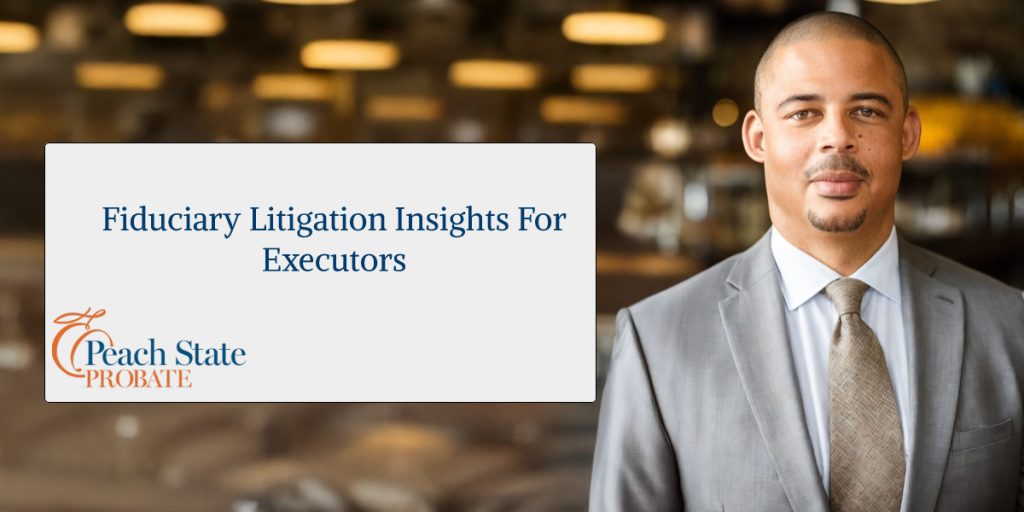## Understanding Fiduciary Litigation: A Key Insight for Executors
Fiduciary litigation pertains to legal disputes that arise from the breach of fiduciary duties by individuals or entities acting in positions of trust, especially executors. These roles demand high ethical standards and significant responsibilities, making it crucial to understand the nuances involved in fiduciary litigation. Executors are tasked with overseeing the distribution of assets in a decedent’s estate and ensuring that beneficiaries receive their fair share while adhering to the terms laid out in the will or by law. Failure to fulfill these duties can lead to legal disputes, making insight into fiduciary litigation essential for any executor.
Within this context, fiduciary litigation encompasses a range of issues, from accounting discrepancies to allegations of mismanagement, self-dealing, or undue influence. Executors may encounter claims from beneficiaries who feel they have been wronged, or alternatively, they themselves may need to take legal action against parties who have violated their duties. Understanding fiduciary litigation is vital for navigating these complexities and ensuring compliance with legal standards.
Moreover, given the potential for family disputes and the emotional nature of estate issues, the stakes can be particularly high. Executors must be prepared to confront challenges, minimize liability, and protect the estate’s interests. Insights into the field of fiduciary litigation empower executors with the knowledge to effectively manage conflicts, fulfill their roles, and mitigate legal risks.
## The Importance of Fiduciary Litigation
Fiduciary litigation matters immensely, as it helps to uphold the integrity of the estate administration process. Trust in fiduciaries is paramount; a breach can lead to significant financial losses and emotional turmoil for beneficiaries. Executors are often seen as the primary guardians of a decedent’s wishes, and their actions (or inactions) can define the outcome of estate processes. The implications of fiduciary litigation extend beyond the courtroom, impacting family relationships and emotional healing during a sensitive time.
Moreover, fiduciary litigation plays a crucial role in ensuring that fiduciaries are held accountable. The law provides specific standards of conduct for those in fiduciary roles, and failing to adhere to these standards warrants legal recourse. For executors, this means maintaining accurate records, communicating transparently with beneficiaries, and making decisions that reflect the best interests of the estate. Legal frameworks surrounding these responsibilities serve to protect not only the estate itself but also the rights of beneficiaries.
Finally, engaging with the nuances of fiduciary litigation can ultimately lead to a more efficient and fair resolution of estate disputes. Executors who understand the potential pitfalls and legal obligations can help avoid protracted legal battles, preserve family relationships, and uphold the deceased’s legacy. As such, insights into fiduciary litigation are not merely academic; they are practical and essential for effective estate management.
## Legal Framework and Context of Fiduciary Litigation
The legal framework governing fiduciary litigation is rooted in the principles of trust and agency law. Executors, as fiduciaries, are legally obligated to act in the best interests of the estate and its beneficiaries. This fiduciary duty encompasses a variety of responsibilities, including the duty of care, duty of loyalty, and duty of impartiality. Failure to meet these obligations can result in fiduciary litigation, where beneficiaries may seek restitution for losses incurred due to the executor’s misconduct.
Fiduciary litigation often involves various legal theories and claims, such as breach of fiduciary duty, negligence, or fraud. Legal actions may arise from disputes about the valuation of assets, decisions related to distributions, or allegations of self-dealing. Courts will typically consider the evidence provided, including financial records and communications between the executor and beneficiaries, to determine if the fiduciary has acted within their legal bounds.
Additionally, state laws can influence the process of fiduciary litigation. In Georgia, for instance, the probate court holds jurisdiction over such matters, providing a platform for settling disputes related to wills and estates. Executors and beneficiaries alike must be aware of both state and federal laws affecting their responsibilities and rights, as this knowledge is crucial for navigating fiduciary litigation effectively.
## Real-World Cases Illustrating Fiduciary Litigation
Examining real-world examples offers valuable insights into fiduciary litigation. One notable case involved an executor who failed to provide accurate accounting to the beneficiaries, leading to a lawsuit alleging breach of fiduciary duty. The court found that the executor had not only mismanaged estate funds but also failed to communicate essential information to the beneficiaries. This case underscores the importance of transparency and proper record-keeping by executors, which can help prevent disputes and maintain trust among family members.
Another example features allegations of self-dealing where an executor sold estate property to themselves at an undervalued price. The beneficiaries raised concerns, and upon investigation, it was revealed that the executor had violated their duty of loyalty. The court ruled in favor of the beneficiaries, compelling the executor to pay damages to the estate. This case illustrates the critical role of impartiality and adherence to ethical standards in estate administration.
Further, fiduciary litigation can also involve claims of undue influence, where a beneficiary contests the validity of a will based on the undue pressure exerted by an executor. In one case, the court found that the executor had manipulated the decedent’s decisions, leading to a significant change in the will that favored the executor. This case demonstrates the complexities involved in determining the validity of such claims while also highlighting the potential for conflict in family dynamics.
## Navigating Fiduciary Litigation: Practical Steps for Executors
Navigating fiduciary litigation involves understanding professional responsibilities and taking proactive steps to mitigate potential disputes. One essential step is to maintain comprehensive and meticulous records of all financial transactions, communications, and decisions made during the estate administration process. Executors should also strive to engage in regular, open communication with beneficiaries to keep them informed about the status of the estate. Transparency fosters trust and can often preempt misunderstandings that may lead to claims of misconduct.
Additionally, executors should familiarize themselves with the applicable legal standards governing their role. This includes a thorough understanding of the will, state laws regarding probate, and any specific requirements concerning fiduciary duties. Clear personal definitions of what constitutes appropriate conduct and adherence to these standards can shield executors from potential legal challenges. Executors may benefit from outlining defined procedures for handling different aspects of the estate and documenting their compliance with these procedures.
Furthermore, if a dispute arises, executors should take immediate, thoughtful action to address concerns raised by beneficiaries. Engaging in constructive dialogue and exploring alternative dispute resolution options, such as mediation, can often result in amicable solutions without resorting to prolonged litigation. Being proactive, organized, and mindful of fiduciary responsibilities can ultimately lead to a smoother administration process and minimize the risk of fiduciary litigation.
## Common Pitfalls Executors Should Avoid
Executors may encounter various pitfalls that can lead to fiduciary litigation if not handled carefully. One common error is failing to communicate effectively with beneficiaries. Lack of transparency can contribute to mistrust and resentment, potentially resulting in formal disputes. Executors must regularly inform beneficiaries about decisions, financial transactions, and any other significant aspects of the estate’s administration. Open lines of communication can significantly alleviate concerns and foster a collaborative atmosphere.
Another critical area where executors may falter is in the management of estate assets. Mismanaging funds, neglecting investment opportunities, or failing to maintain property can raise questions about an executor’s competency and adherence to their fiduciary duty of care. Executors should educate themselves on asset management principles and consider consulting financial professionals when necessary to ensure proper handling.
Finally, executors should avoid the temptation of self-dealing, which can lead to severe repercussions in fiduciary litigation. Actions that personally benefit the executor or compromise the interests of the beneficiaries can attract legal scrutiny and result in lawsuits. It is essential for executors to act impartially and prioritize the estate’s best interests, adhering strictly to the terms established in the will and any governing state laws.
## Consulting with an Attorney: When Executors Need Legal Help
Executors may find themselves needing to consult with an attorney in various situations related to fiduciary litigation. Engaging an attorney can be particularly beneficial during times of uncertainty or conflict, such as when beneficiaries voice complaints or raise concerns. An experienced attorney specializing in fiduciary litigation can provide valuable guidance on how to address claims and navigate the complexities of estate law.
Another scenario that warrants seeking legal counsel is when an executor faces claims of misconduct or breach of duty. If accusations arise, an attorney can advise on appropriate defenses, help clarify the executor’s obligations, and provide strategies for protecting the estate and its interests. Legal representation is critical not only for addressing disputes but also for assuring beneficiaries that actions are being taken in line with state laws.
Furthermore, consulting with an attorney can also facilitate more efficient estate administration by ensuring compliance with all relevant statutory requirements. This can help avert issues before they can escalate into litigation. An attorney can assist in drafting communications, preparing necessary documents, and offering strategic advice to ensure that the executor acts prudently while fulfilling their duties under the law.
## Enhancing Estate Outcomes: The Value of Legal Representation
Legal representation is a significant asset for executors navigating fiduciary litigation. An attorney specializing in this field can provide insightful expertise and guidance, helping to clarify the executor’s rights and obligations. Such representation ensures that executors make informed decisions while protecting the interests of the estate and beneficiaries. Understanding applicable laws and regulations can promote smoother estate administration and avoid the pitfalls that lead to litigation.
Additionally, skilled legal counsel can enhance communication with beneficiaries, addressing concerns preemptively before they escalate into formal disputes. An attorney can craft communications that reassure beneficiaries and clarify the executor’s actions, fostering transparency and trust. Through negotiations and mediation, legal representation can facilitate resolution and create an environment that prioritizes the estate’s best interests.
Finally, the presence of an attorney reinforces the executor’s credibility when facing claims of misconduct. A well-prepared legal defense, rooted in a clear understanding of fiduciary duties, can significantly bolster the executor’s position in court. Engaging with legal representation not only promotes compliance with fiduciary obligations but also ensures that executors are well-equipped to handle challenges efficiently, thereby enhancing the overall outcome of estate proceedings.
## How Peach State Probate Supports Executors in Fiduciary Litigation
Peach State Probate stands out as a premier choice for executors navigating fiduciary litigation in Georgia. The firm’s deep understanding of state-specific laws and processes allows for tailored support in estate administration. Peach State Probate offers personalized guidance to executors, helping them navigate the complexities of fiduciary litigation while safeguarding the interests of the estate and its beneficiaries.
Furthermore, the firm’s approach emphasizes proactive communication and transparency, crucial factors in minimizing disputes and fostering positive relationships among family members. Peach State Probate collaborates with executors to ensure that all actions align with fiduciary duties, thereby reducing the likelihood of litigation. The firm’s commitment to guiding clients through the probate process is reflected in its comprehensive support, from initial estate assessments to ongoing litigation concerns.
In addition, Peach State Probate’s extensive experience with fiduciary litigation means that clients benefit from insights that can help avoid common pitfalls. Whether dealing with questions of self-dealing or accusations of mismanagement, the firm is equipped to craft strategic responses that prioritize the best interests of the estate. Executors can feel confident in their choices when supported by a knowledgeable and dedicated legal team.
## Frequently Asked Questions About Fiduciary Litigation




